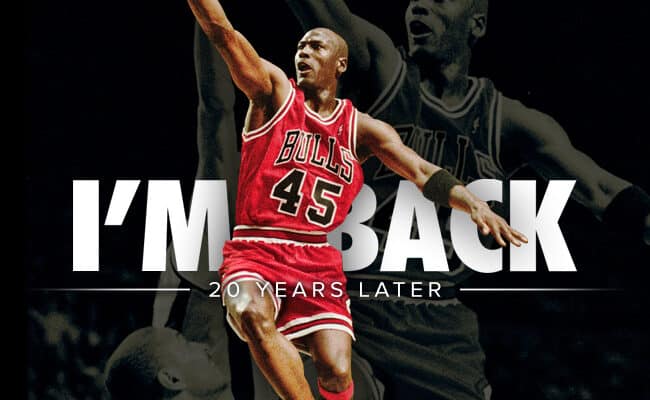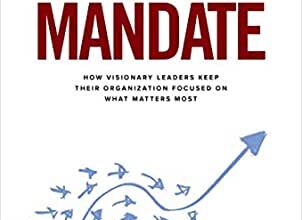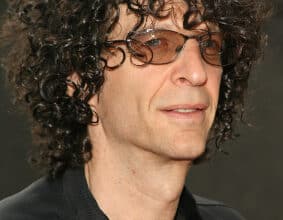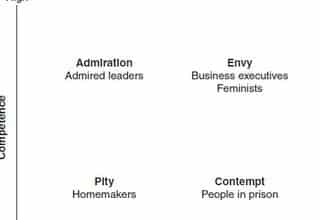Its hard to image that twenty years have passed since Michael Jordan took himself out of retirement and returned to basketball. If you may recall, he left in 1993 to fulfill his (other) dream, professional baseball. After two years, a MLB labor strike, and his enduring desire to compete, Michael made the decision to take back his throne as the foremost player in the NBA.
It was a story that transcended sports because of who Jordan was in society. This is Babe Ruth and Muhammad Ali. This is not basketball any more… It was sort of a sporting version of the resurrection of Christ.” – Sam Smith, longtime Bulls beat writer and author of three Michael Jordan books
Michael was not the first to return to his team after an extended hiatus, but his homecoming was one of the memorable. After I read Jared Zwerling’s article in Bleacher Report, it’s clear Michael was enthusiastically welcomed back partially due to his God-like status on the court, but also because he came back the right way. Here are three lessons we can all take away from Michael about how to make a successful comeback.
#1 A burned bridge is rarely rebuilt
To come back the right way, it helps if you left the right way. When Michael originally retired from the Bulls, he left the team with three straight NBA titles and unprecedented team support. Unfortunately, his father had been tragically murdered just a few months earlier and, as Michael stated in his announcement, “I always said to the people that have known me that when I lose that sense of motivation and that sense that I can prove something, it’s time for me to leave.”
Michael was stoic and appreciative. On the flipside, I’ve seen people unexpectedly storm out in a rage, publically denigrate the boss, and pull a Jerry McGuire-esque “I’m starting a new company, who’s comin’ with me” speech. When I’ve spoken to these individuals after the fact, it seems as though their venting was briefly cathartic but did not provide any longstanding satisfaction.
Instead of baring your soul, leave with grace. Walk out like you are doing it on purpose, not as a victim. Refrain from throwing insults, accusations, and office supplies; instead throw compliments, appreciation, and the classic “thank you for the opportunity.” Then when you make your comeback, there will be less apologies and more warm greetings.
#2 Re-earn your spot on the team
You may have left the conquering hero, but that doesn’t mean you’ll be welcomed back with the same fanfare. When Michael made the decision to come back, it was on much more than a whim. Months before officially un-retiring, Michael recognized that he was in shape for baseball but not basketball, so he began an intense workout routine. Days began with team-wide scrimmage games.
The practices started to be much more heated, much more competitive—longer even, too. We had to get a lot of work in to get Michael up to speed with the team, or the team up to speed with Michael depending on which way you want to look at it. – Luc Longley, Chicago Bulls Backup Center
After scrimmages, Michael organized one-on-one practices with various teammates. Plus, he and his personal trainer met every morning and evening for strength, conditioning, and stretching.
He was basically testing himself to see where he was. – Tim Grover, Michael Jordan’s personal trainer
If all this work was exerted by one of the greatest basketball players of all time, what makes you think you can saunter back without any preparation? Learn how the industry, organization, and team changed. What are the future goals? And just as Michael set up one-on-one practices, put your ego aside and involve others in your re-education.
#3 No one wants a lecture
It not just how you comeback, it’s how you communicate it. Michael’s agent drafted four versions of the press release announcing Jordan’s return to the Chicago Bulls. He included how much Michael missed the game and other heartfelt sentiments. Uncomfortable with the language, Michael decided to write it himself.
I’m back.
No explanation or justification. No backpedaling or regret for leaving. With two words, Michael expressed excitement, anticipation, and the straightforward fact that he was back. Your communication can be just as simple. If you feel the need to expand, build on why you wanted to come back, what you hope to accomplish, and how much you missed the people and the organization.
It was classic Michael Jordan. It was elegant in simplicity, it communicated how he felt, it said it all. – David Falk, Michael Jordan’s agent
There are many reasons why you need to make a comeback. You may have left to pursue other dreams, explore opportunities, or escape a regime change. Other comebacks result from less literal absences – burnout, recovering from a setback, reinventing yourself. Regardless of the circumstances, return with style and class. If you can’t manage this, I hope your defensive game is as good as Michael’s. You are going to need it.








